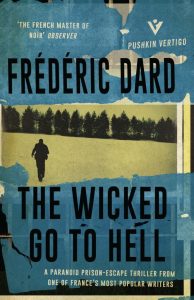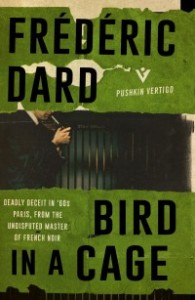The Wicked Go To Hell – Frédéric Dard
 ‘The Wicked Go To Hell’ is the second novel by Frédéric Dard published by Pushkin Press through their Vertigo imprint. Dard was one of France’s most prolific and influential crime writers of the XXth century, with over 280 novels, 16 plays and sundry other writing to his credit (and to that of his countless noms de plume)
‘The Wicked Go To Hell’ is the second novel by Frédéric Dard published by Pushkin Press through their Vertigo imprint. Dard was one of France’s most prolific and influential crime writers of the XXth century, with over 280 novels, 16 plays and sundry other writing to his credit (and to that of his countless noms de plume)
‘The Wicked Go To Hell’ is an unconventional but highly interesting work: it is the novel adaptation, published originally in 1956, of Dard’s 1954 play Les salauds vont en enfer, which was first staged by renowned French actor and director Robert Hossein, who also directed the play’s film version in 1955.
It is quite a short work, more a novella than a full-blown work of fiction, and it is pithier and more immediate than other works by Dard. As much as to the French writer’s typically straightforward style, the direct nature of the narrative owes much to the novel’s genesis as a play.
After a cagey introduction in which an unknown narrator tells how he is ordered by his police boss to help an equally unknown convict to escape from prison, in order to capture the rest of the convict’s criminal organisation, the story takes the reader straight to the French prison where two men, Hal and Frank, make a rather bumpy landing as new inmates.
Upstaging the reader with a clever narrative device, the lynchpin of the whole novel, Dard doesn’t reveal whether it is Frank or Hal who’s the convict, or conversely the undercover cop. It’s a neat trick which hooked me into trying to outguess Dard, and I confess that soon I was leafing through the introduction again, trying to unearth any detail that would reveal who was who.
In fact both Hal and Frank are convinced the other is a police plant, and begin their prison relationship by mistrusting and fighting each other, and by irking the sadistic warder, known as the Bull, who oversees their cell block.
After a particularly violent incident, they’re locked up in solitary confinement for a week. The solitude gives them a measure of perspective, and they gradually come to accept each other and to ignore the question that’s vexing both of them, and the reader: who’s the criminal and who’s the cop? They will grudgingly draw closer, until they decide to try to escape, profiting from the change in prison routine brought about by the execution of another inmate (in France the death penalty was abolished in 1981).
They will succeed after a bloody struggle with the warders and the police, which Dard describes with matter-of-fact brutality, more chilling than many a gory, action-adrenalin scene by other authors. The two prisoners end up stealing a boat from a nearby harbour and escape by sea, eventually landing on a small island close to the coast, where they lie low for a while.
While escaping from prison, Frank was wounded in the face and has vision problems, and this allows Dard to add a new twist to the two men’s uncomfortable relationship, which once again is played out within claustrophobic confines: first a prison cell, now a rough fisherman’s hut nestled on the tiny island. The claustrophobia is cleverly rendered, though it’s at once one of the novel’s most interesting features and one of its drawbacks. ‘The Wicked Go To Hell’ is mostly about situation and not much about plot, and this might prove less than satisfactory to readers seeking a quick thrill, or a more structured story.
The same could be said about Dard’s main narrative device, that of not revealing from the outset which of the characters is the good guy and which the bad guy. It’s a brilliant authorial choice in terms of keeping the reader interested and guessing, constantly trying to put both protagonists’ thoughts and actions in the perspective of this uncertainty. As a result of this choice though, Dard is forced to also hide from the reader’s view much of what goes on inside the heads of Frank and Hal. This lack of an inner window on the characters’ minds can occasionally be a little frustrating. I assume many readers would, like me, prefer to feel closer to the protagonists, and identify more with them.
As I mentioned at the outset however, Dard’s choice originates from the novel’s genesis as a play and, once this is allowed for, what remains is a trademark Dard story: gritty, fast-paced and cunningly structured, infused with the delicious pleasure of upstaging genre conventions and blurring the line between good and evil, between accepted mores and what’s justifiable to protect the social order. More than enough good reasons, in my opinion, to look forward to reading more of Dard’s works in translation by Pushkin Press.





I wasn’t familiar with Dard before this review, but I will add him to the list. In general, I’m a fan of just about all 20th century French crime fiction for its atmosphere of existential menace. Thanks!